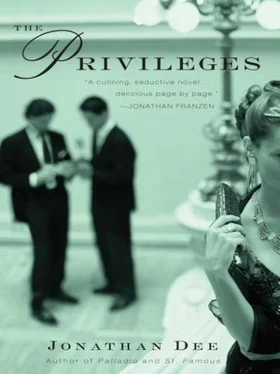Though he kept to the south side of 81st Street, where the sidewalks were wider on the perimeter of the museum grounds, it was still stop and go; he had to work his way around or through the knots of tourists and the pairs of strollers advancing in unison as their nannies chatted behind them. There was nothing to be done until he crossed the transverse exit at Central Park West and passed through the low stone gate into the park, and then he found his rhythm. He glided around the softball fields, passing everyone else on the path — the fat guys with headbands and hair leaking up from the collars of their shirts, the women in Lycra tights with sweatshirts tied self-consciously around their waists, the serious rope-muscled runners with the perfect strides and fixed stares — feeling the familiar warmth and pulse of his blood radiating from his core until there was no part of his body uninvolved in it. He’d never been to the Conservatory Garden before, but he knew roughly where it was — not far from their old apartment, the one where April and Jonas had shared a room. He could have shortened his time by cutting across the North Meadow but it was blocked by that temporary soft orange fencing that signaled a reseeding; so he passed all the way out of the park again on the east side and turned north along Fifth Avenue until he saw the theatrical flight of stone steps that led down into the garden. It was laid out in the dimensions of a cross, with trellised roses and reflecting pools on the right and left of him; at the far end, at the foot of a flagstone path, another flight of steps led up to a long, curved, and colonnaded stone arch, and there, sitting on the top step with his arms around his knees, wearing a khaki suit, was Devon.
He stood up slowly and bemusedly as Adam sprinted up the steps, touched his watch again, and stood gazing around the garden with his hands clasped on top of his head, waiting for his heart rate to slow. “Multitasking,” Devon said, a little bitterly. “Nice. No reason meeting me should interfere with your regimen. Won’t you have to go home and change now, though, before work, or is it Casual Tuesday or something?”
Adam shook his head. “Not going in this morning,” he said. “The boss and I are flying to Minneapolis in a few hours.”
They stood beneath the arch, facing back toward Fifth Avenue across the top of the sunken gardens. In the unseasonable cold the paths were almost empty, but not quite; the incongruous country-squire layout made it a popular spot for wedding photos, and so there was a full bridal party standing by one of the reflecting pools, blowing on their hands to keep warm, while a couple of boys in suits who couldn’t have been older than six chased each other around the still water. In fact, Adam was the only one in the whole garden not dressed formally. Still, Devon felt like the conspicuous one.
“So?” Adam said. “Shall we go talk amongst the roses?”
“Why not,” Devon said. “I’m sure everybody thinks we’re fags anyway.”
They descended the steps and turned left on the flagstones toward the unoccupied reflecting pool. “Miguel is out,” Devon said.
“No names, please.”
“Whatever. One of my associates has told me he’s out. The one who works at Schwab. He’s getting married. He says he’s made enough and doesn’t want this hanging over his head anymore.”
“Okay,” Adam said. “You think he’s telling the truth? There’s nothing else going on there, no trouble he’s in, no debts or anything like that?”
“Why?” Devon said. He meant to sound sarcastic but it just came out petulant. “You thinking of having him killed?”
Adam rolled his eyes. “I’m just wondering why you considered it some kind of emergency. It’s happened before. I mean, you know this isn’t a good idea, our meeting like this. Not that I don’t enjoy your company.”
As they finished their first circuit Devon looked up and saw a strange bald man in a tuxedo struggling to fix an expensive camera onto a tripod. He was all the way across the garden, where the bridal party was, but the camera looked like it was pointing right at him. He fought down a taste of panic in his throat. “That’s kind of my point, that this same thing happened two months ago. It’s not like we can take out an ad to replace these guys. Pretty soon it will be down to you and me, and that would not be tenable. We couldn’t disguise it well enough.”
“Well,” Adam said, “you know a lot more guys in the trenches than I do. Can you think of anyone else you might bring in?”
Devon grimaced. “Yes, probably,” he said, “but that’s not the point. We can’t keep piling risk upon risk, right, and expect to stay lucky forever. I don’t know. Honestly I’m wondering if it’s time to get out. I want to be smart about this. I mean, am I the only one? Don’t you think about this stuff? Aren’t you fucking freezing, by the way?”
Of course Adam thought about it, not because he was prone to fear or paranoia but just as a matter of risk management. He saw perfectly clearly that the whole arrangement was held together at this point only by own his ability to lead, to inspire faith in himself even among people he met only briefly, if ever. Any one of these brokers, Devon included, who slipped up and got caught could always save himself by giving up the top of the chain, and the top of the chain was Adam. So he wasn’t sure what there was for Devon to get so stressed about. He had to admit that his initial assessment of the kid, aboard the Intrepid all those years ago, had turned out to be wrong in some respects, though not, of course, in the important one.
“You say you want to be smart about it,” he said, looking into Devon’s eyes. “But to say that we can’t be successful today because we were successful yesterday — that’s not smart, that’s just superstitious. You start giving in to ideas about luck or fate or karma or whatever and you’re fucked. There’s no fate. Everything that you and I have made happen in these last however many years? It never happened. It’s gone. It doesn’t exist. The only thing that exists, the only risk to be analyzed, is what’s in front of us today.”
“I know,” Devon said sulkily. He looked down. Adam knew he had him.
“We are hypercareful. We always have been. We don’t give every piece of information to everybody in the chain. And I’m sure you figured out a long time ago that some of the information I give you is bogus, so it never looks to anyone like some unbroken winning streak.”
“I’m not questioning anything like that. It’s just — the whole thing isn’t like I thought it would be. The money is almost like a burden because I’m so paranoid about spending it. And how can you not look back? I don’t get that. Which is probably why I’ll never be a billionaire. I’m just not a stone killer like you are. See, that’s another thing I don’t get: as little as I know about you, I know that you are one of those guys, those guys who are like missing a part of their brain or something. No conscience. No memory for losses. So you don’t need this. You’d be a player anyway. Why are you doing it still? Don’t you think about stopping?”
The bridesmaids had run off to the car to get warm and the wedding photographer was packing his gear into a couple of canvas bags. No conscience? Adam thought. It’s not as though I can’t remember; it’s just that there’s nothing constructive about remembering. Still, when he did consider the life his family was living now, a life in which literally anything was possible, every desire was in reach, no potential was allowed to wither, and they had all seen so much of the world; when he thought back to the moment he had gone for it, to his own fearlessness when threatened with the unhappiness of those he loved, and how readily, in the face of that, he had cleared the hurdle that most men would never have the fortitude to clear; and how all this was accomplished by his taking all the risk onto himself, so much so that they would never even have a clue that there was any risk involved; the only reasonable conclusion, he felt, was that it was the noblest thing he had ever done in his life. It was humility, really, that made him so uncomfortable reminiscing about it.
Читать дальше












